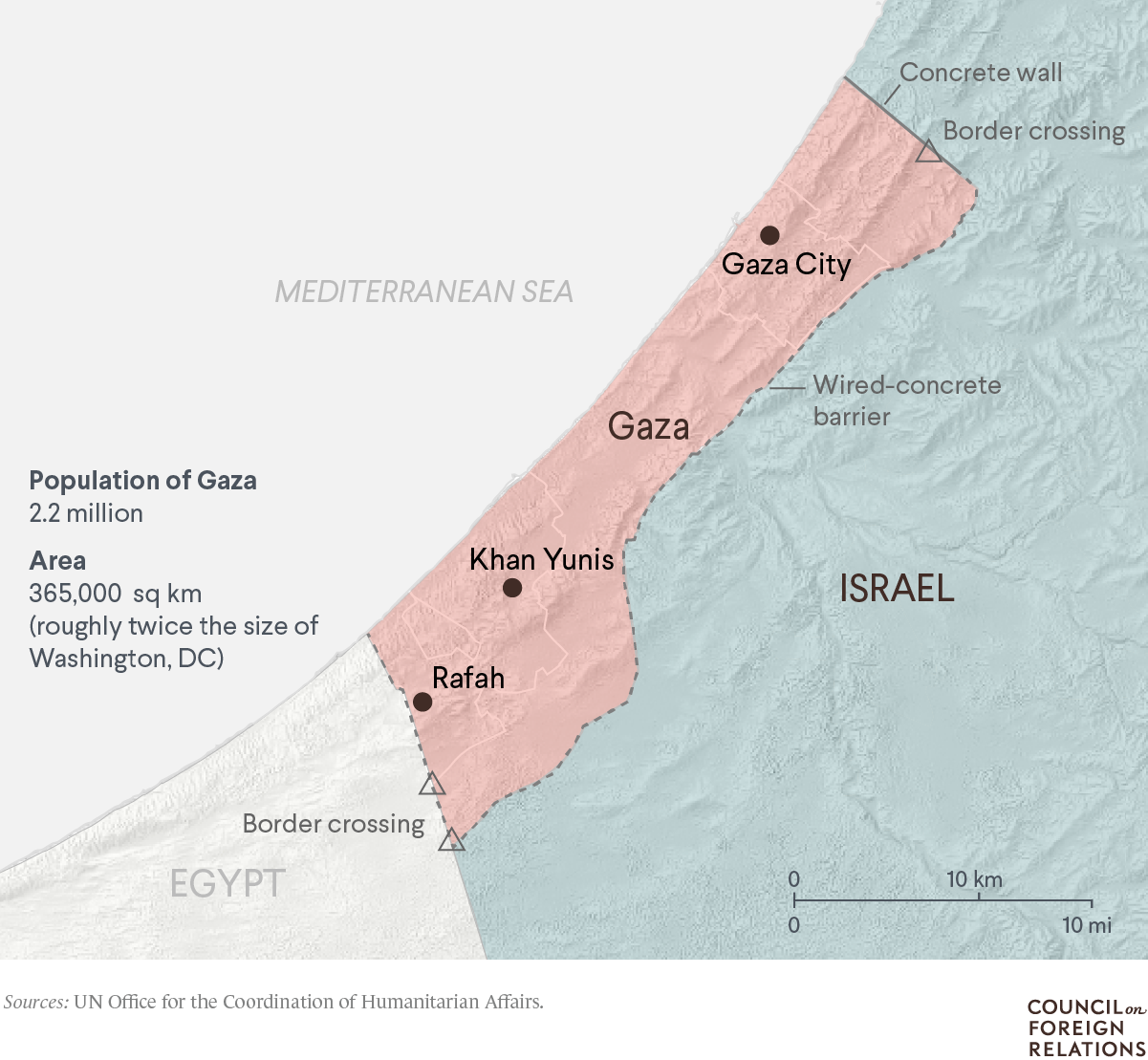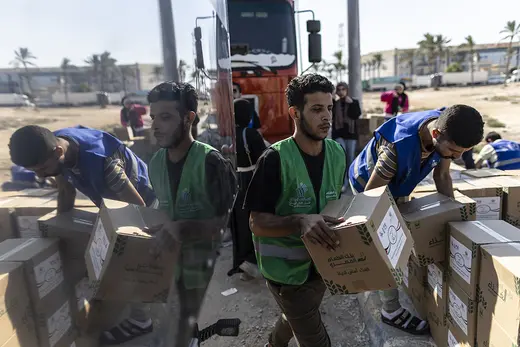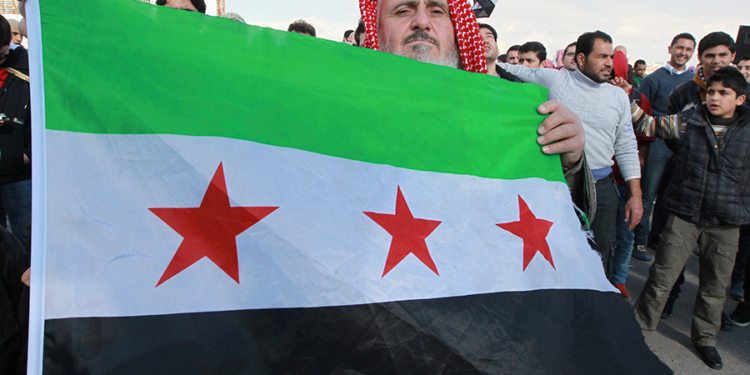How has Egypt responded to Hamas’s October 7 attack on Israel?
Immediately after the attacks, the Egyptian government issued a statement that warned of “dire dangers of the ongoing escalation between the Palestinian and Israeli sides, following a series of attacks against Palestinian cities,” without mentioning Hamas’s incursion into Israel, murders of civilians, and hostage taking. This statement is consistent with those from most Arab countries, which for the most part have placed blame for the violence on Israel, particularly its settlement building in the West Bank and conduct in the Gaza Strip.
On October 15, Egyptian President Abdel Fatah al-Sisi declared that the Israel Defense Forces’ operations had exceeded any proportionate response to the October 7 attacks and become a form of collective punishment. Sisi needs to be careful in how he manages the conflict given both his own unpopularity amid Egypt’s economic crisis, and the broad pro-Palestinian sentiment among the Egyptian public. He is unpopular because of his mishandling of the Egyptian economy, and he surely knows that a variety of organizations involved in the January 2011 uprising that toppled Egyptian President Hosni Mubarak originated in pro-Palestinian solidarity groups that emerged during the second intifada.
Will Egypt accept Palestinians fleeing Gaza?
More on:
Four related reasons explain why the Egyptian government, which has been full partners with Israel in a yearslong blockade of Gaza, has insisted that Israel allow humanitarian aid into Gaza rather than let Gazans flee into the bordering Sinai Peninsula. First, Egypt does not want to be responsible for a wave of Palestinian refugees. The country is already struggling to manage the influx of people fleeing Sudan’s civil war. Even if there were not 317,000 Sudanese seeking safety in Egypt, the Egyptian government has few resources to manage the large numbers of Palestinians who could arrive in Sinai—an area far from Cairo that has had its own problems with extremism. Second, Egypt worries about potential threats to its own security given links between Hamas and the so-called Sinai Province affiliate of the self-declared Islamic State, which Egypt has been battling for about a decade in northern Sinai. Allowing large numbers of Palestinians into their territory, Egypt’s leaders fear, would strengthen the links between these extremist forces.

The World This Week
A weekly digest of the latest from CFR on the biggest foreign policy stories of the week, featuring briefs, opinions, and explainers. Every Friday.
The third reason is that, on principle, the government of Egypt maintains that the plight of Palestinians in the Gaza Strip is Israel’s responsibility. And finally, Egypt fears that Israel will try to foist responsibility for Gaza onto Cairo. Egypt occupied the territory until the June 1967 Six-Day War against Israel, when Egyptian forces fled Gaza. Over the years, Israeli officials have from time to time spoken of an “Arab solution” to governing Gaza. In Cairo, that is interpreted as a way for Israel to push the territory and its 2.2 million inhabitants onto Egypt.
What has Egypt’s relationship with Hamas looked like?
The Egyptian government and Hamas have an uneasy relationship. Hamas was created out of the Palestine branch of the Muslim Brotherhood in the late 1980s, and it was formed specifically to engage in violence against Israelis (and Jews more broadly) and counter the influence of Palestinian Islamic Jihad, an Iranian proxy group that had been waging a terrorist campaign against Israel. Given Egypt’s relationship with the Muslim Brotherhood, which tends to oscillate between grudging tolerance and outright hostility, Egypt’s leaders have sought to control Hamas for fear that it could contribute to instability within the Nile Valley. As a result, Egypt’s intelligence service has a presence in Gaza and keeps a watchful eye on Hamas activities there.
Does Egypt play a role in any regional efforts to contain the conflict or create a cease-fire?

Mahmoud Khaled/Getty Images
In the past, Egypt’s presidents and General Intelligence Service have played important roles in securing cease-fires between Israel and Hamas. But neither Israel nor Hamas is interested in de-escalation at this stage of the current war. Perhaps in time Egypt will have a larger role to play, but for the moment, the United States is pressing it to open humanitarian corridors in the Sinai Peninsula.
What is the status of Egypt’s relationship with Israel? Are there any signs that Egypt warned Israel of an impending attack?
The Egypt-Israel peace treaty has survived many crises since it was signed in 1979, including Israel’s 1982 invasion of Lebanon, the first intifada, the second intifada and Israel’s reinvasion of the West Bank, and successive conflicts between Israel and Hamas since Israel withdrew from Gaza in 2005. During the forty-nine-day Israel-Hamas conflict of 2014, Egypt wanted Israel to destroy Hamas, but Israel demurred, fearing a power vacuum and chaos in the area. Those positions have now switched, placing pressure on bilateral relations. Still, at the moment, there is no indication that Egypt would want a breach in ties; Egypt’s government benefits too much from Israeli help securing the Sinai Peninsula.
More on:
There are news reports that Egypt had developed intelligence of an attack and warned Israel, but that the warning went unheeded.
In Brief
Will Egypt Play a Role in Easing the Gaza War?
By
Steven A. Cook, CFR Expert
October 16, 2023 3:39 pm (EST)
Egypt remains reluctant to welcome Palestinians seeking to flee Gaza as Israel prepares a retaliatory offensive against Hamas, and hopes of a Cairo-mediated cease-fire remain premature. Here’s what’s behind Egypt’s position.
How has Egypt responded to Hamas’s October 7 attack on Israel?
Immediately after the attacks, the Egyptian government issued a statement that warned of “dire dangers of the ongoing escalation between the Palestinian and Israeli sides, following a series of attacks against Palestinian cities,” without mentioning Hamas’s incursion into Israel, murders of civilians, and hostage taking. This statement is consistent with those from most Arab countries, which for the most part have placed blame for the violence on Israel, particularly its settlement building in the West Bank and conduct in the Gaza Strip.
On October 15, Egyptian President Abdel Fatah al-Sisi declared that the Israel Defense Forces’ operations had exceeded any proportionate response to the October 7 attacks and become a form of collective punishment. Sisi needs to be careful in how he manages the conflict given both his own unpopularity amid Egypt’s economic crisis, and the broad pro-Palestinian sentiment among the Egyptian public. He is unpopular because of his mishandling of the Egyptian economy, and he surely knows that a variety of organizations involved in the January 2011 uprising that toppled Egyptian President Hosni Mubarak originated in pro-Palestinian solidarity groups that emerged during the second intifada.
Will Egypt accept Palestinians fleeing Gaza?
More on:
Four related reasons explain why the Egyptian government, which has been full partners with Israel in a yearslong blockade of Gaza, has insisted that Israel allow humanitarian aid into Gaza rather than let Gazans flee into the bordering Sinai Peninsula. First, Egypt does not want to be responsible for a wave of Palestinian refugees. The country is already struggling to manage the influx of people fleeing Sudan’s civil war. Even if there were not 317,000 Sudanese seeking safety in Egypt, the Egyptian government has few resources to manage the large numbers of Palestinians who could arrive in Sinai—an area far from Cairo that has had its own problems with extremism. Second, Egypt worries about potential threats to its own security given links between Hamas and the so-called Sinai Province affiliate of the self-declared Islamic State, which Egypt has been battling for about a decade in northern Sinai. Allowing large numbers of Palestinians into their territory, Egypt’s leaders fear, would strengthen the links between these extremist forces.

The World This Week
A weekly digest of the latest from CFR on the biggest foreign policy stories of the week, featuring briefs, opinions, and explainers. Every Friday.
The third reason is that, on principle, the government of Egypt maintains that the plight of Palestinians in the Gaza Strip is Israel’s responsibility. And finally, Egypt fears that Israel will try to foist responsibility for Gaza onto Cairo. Egypt occupied the territory until the June 1967 Six-Day War against Israel, when Egyptian forces fled Gaza. Over the years, Israeli officials have from time to time spoken of an “Arab solution” to governing Gaza. In Cairo, that is interpreted as a way for Israel to push the territory and its 2.2 million inhabitants onto Egypt.
What has Egypt’s relationship with Hamas looked like?
The Egyptian government and Hamas have an uneasy relationship. Hamas was created out of the Palestine branch of the Muslim Brotherhood in the late 1980s, and it was formed specifically to engage in violence against Israelis (and Jews more broadly) and counter the influence of Palestinian Islamic Jihad, an Iranian proxy group that had been waging a terrorist campaign against Israel. Given Egypt’s relationship with the Muslim Brotherhood, which tends to oscillate between grudging tolerance and outright hostility, Egypt’s leaders have sought to control Hamas for fear that it could contribute to instability within the Nile Valley. As a result, Egypt’s intelligence service has a presence in Gaza and keeps a watchful eye on Hamas activities there.
Does Egypt play a role in any regional efforts to contain the conflict or create a cease-fire?

Mahmoud Khaled/Getty Images
In the past, Egypt’s presidents and General Intelligence Service have played important roles in securing cease-fires between Israel and Hamas. But neither Israel nor Hamas is interested in de-escalation at this stage of the current war. Perhaps in time Egypt will have a larger role to play, but for the moment, the United States is pressing it to open humanitarian corridors in the Sinai Peninsula.
RelatedPost
What is the status of Egypt’s relationship with Israel? Are there any signs that Egypt warned Israel of an impending attack?
The Egypt-Israel peace treaty has survived many crises since it was signed in 1979, including Israel’s 1982 invasion of Lebanon, the first intifada, the second intifada and Israel’s reinvasion of the West Bank, and successive conflicts between Israel and Hamas since Israel withdrew from Gaza in 2005. During the forty-nine-day Israel-Hamas conflict of 2014, Egypt wanted Israel to destroy Hamas, but Israel demurred, fearing a power vacuum and chaos in the area. Those positions have now switched, placing pressure on bilateral relations. Still, at the moment, there is no indication that Egypt would want a breach in ties; Egypt’s government benefits too much from Israeli help securing the Sinai Peninsula.
More on:
There are news reports that Egypt had developed intelligence of an attack and warned Israel, but that the warning went unheeded.

































